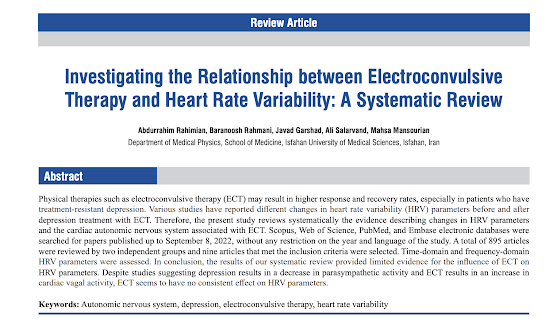ECT and Heart Rate Variability: New Review From Iran
Out on PubMed, from investigators in Iran, is this review:
Investigating the Relationship between Electroconvulsive Therapy and Heart Rate Variability: A Systematic Review.
Adv Biomed Res. 2023 Aug 31;12:210. doi: 10.4103/abr.abr_95_23. eCollection 2023.PMID: 38073723
Physical therapies such as electroconvulsive therapy (ECT) may result in higher response and recovery rates, especially in patients who have treatment-resistant depression. Various studies have reported different changes in heart rate variability (HRV) parameters before and after depression treatment with ECT. Therefore, the present study reviews systematically the evidence describing changes in HRV parameters and the cardiac autonomic nervous system associated with ECT. Scopus, Web of Science, PubMed, and Embase electronic databases were searched for papers published up to September 8, 2022, without any restriction on the year and language of the study. A total of 895 articles were reviewed by two independent groups and nine articles that met the inclusion criteria were selected. Time-domain and frequency-domain HRV parameters were assessed. In conclusion, the results of our systematic review provided limited evidence for the influence of ECT on HRV parameters. Despite studies suggesting depression results in a decrease in parasympathetic activity and ECT results in an increase in cardiac vagal activity, ECT seems to have no consistent effect on HRV parameters.
Keywords: Autonomic nervous system; depression; electroconvulsive therapy; heart rate variability.
The article is here.
And from the text:

Well, there must be an interesting signal here, justifying ongoing interest in the way ECT affects the autonomous nervous system. The literature is small and inconclusive, but, as the authors note, this could be related to methodological/technical difficulties in measuring HRV.
(Please see also blog post of November 28, 2023 for related considerations.)





The below comment is from Dr. William V. McCall:
ReplyDeleteI read with interest the blog report on, and the paper by, Rahimian et al. regarding HRV and ECT.
Coincidentally, our group reviewed the same literature, published this same month:
McCall WV, Thomas A, Miller BJ, Rosenquist PB. The Role of the Autonomic Nervous System in the Mediation of the Resolution of Suicidal Ideation With Electroconvulsive Therapy: A Hypothesis and Review of Heart Rate Variability Over a Course of Electroconvulsive Therapy. J ECT. 2023 Dec 1;39(4):214-219
Like Rahimian et al, we concluded that the ECT-HRV literature is a mess – largely because of (1) lack of consistent reporting of the timing of the HRV assay in regards to the timing of ECT, (2) the use of concomitant meds, and (3) variability in the choice among the many numerous HRV variables chosen as primary outcomes.
However, we differed from Rahimian et al. in our interpretation of the data. After excluding papers that report the immediate effects of ECT, and excluding the papers that report the remote effects of ECT on HRV, we sensed that the balance of the data favored an ECT-related enhancement of HRV. In turn, this enhancement of HRV may play a role in the anti-suicide effects of ECT.
Regardless, this topic needs more discovery, using consensus-based methods and we are happy to see that Rahimian et al. are also pursuing this lead.
W.Vaughn McCall, MD